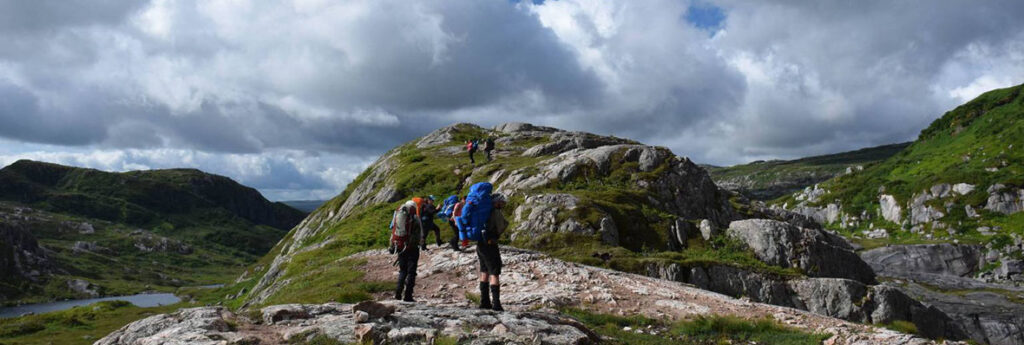Canadians are using trails across Canada in greater numbers since the onset of COVID-19 with usage up close to 50 percent across all age groups according to a recent survey. When asked to compare their trail use to summer/fall 2019, 76 percent of Canadians said they are using trails as much or more than before with 44 percent confirming that they have increased their usage.
The national Léger survey was commissioned by the Trans Canada Trail (TCT) organization. The Montreal-based TCT is the steward of the 27,000 km Great Trail of Canada, the longest recreational trail in the world.
Among Canadians 18-24 and 25-34, usage has increased by 55 and 52 percent respectively. Among Canadians aged 55-64 and over 65, usage has increased by 39 and 35 percent respectively, with a higher percentage of these Canadians indicating that their trail usage had remained constant at 38 and 42 percent respectively.
“This confirmation of increased use mirrors what we have seen on our network, and what our trail partners and operators have told us: trail use is up across the country as Canadians seek a refuge from social isolation and a haven that connects them to nature. The data also underscores the fact that Canadians, especially now, value their access to trails and see them as a way to enhance their physical and mental health,” said Eleanor McMahon, President & CEO of Trans Canada Trail.
In terms of how and why Canadians are using trails during this pandemic period, TCT asked Canadians about whether enhancing their mental health motivated their decision to use trails, and 95 percent confirmed that this is the case. Amongst Canadians 18-24 this number jumps to 100 percent, with 97 percent of those over 65 indicating that their mental health and well-being is what prompts their use of trails.
When it comes to using trails for physical exercise and fitness, 95 percent of Canadians cited this as motivating their trail use, with 88 percent of Canadians aged 18-24 agreeing that this is the case, and 98 percent of Canadians 65 and over citing this as their motivation. Access to nature also dominated as a reason why Canadians use trails with 99 percent of Canadians agreeing that the opportunity to be outdoors led them to use trails.
“This data underscores the fact that trails make important contributions to our social well-being as well as to our physical and mental health. Together with the data on increased trail use, it is clear that trails have become a lifeline for Canadians during COVID-19 providing them with vital connections to nature, and to each other,” McMahon noted.
“The survey results also confirmed that Canadians’ trail use is poised to continue – despite the arrival of winter – with 69 percent intending to use trails this winter. While winter trail use is higher amongst younger Canadians, 64 percent of those aged 65 and older indicated that they intend to keep using trails,” McMahon said.
“This is a very positive sign, given concerns about increased social isolation as winter approaches. It also makes the case for why trails should remain open, particularly with access to gyms, community and recreation centers limited across Canada. Indeed, it prompted the recent launch of our winter trails program, with TCT providing funding to trails groups for initiatives that will ensure safe trail use during winter,” McMahon noted.
The survey also found that Canadians strongly agree that trails are an important source of community recreation (91 percent), contribute to the economic development of our communities (76 percent) and to building our tourism economy (77 percent). When it comes to investing in the development of trails and in maintaining them, 89 percent of Canadians agree that the government has an important role to play.
Additional Léger survey data on trails in Canada:
• Winter trail use and COVID-19: All (69 percent), 18-24yrs (84 percent), 25-34yrs (82 percent), 65 years and older (64 percent)
• Winter vacation plans: 78 percent of Canadians who have 2021 winter vacation plans are considering including the usage of trails in their winter vacation plans
• Trails are important in the maintenance of my physical health: 90 percent confirmed that trails are somewhat important, or very important with 95 percent of Canadians aged 18-24 and 91 percent of Canadians 55 and over, responding affirmatively.
• When asked if trails are important in terms of the maintenance of their overall mental health 88 percent of Canadians affirmed their importance with 92 percent of Canadians 25-34 and 88 percent of Canadians 65 years old and above agreeing this is important.
“Throughout the COVID-19 pandemic, Canadians have been looking for ways to stay active and connected to friends, family and neighbors while respecting the physical distancing requirements recommended by public health officials,” McMahon noted. “For many, local trails have become the answer to their search. The ability to access free recreation areas close to home has made a tangible difference in the way they have been able to cope with the massive lifestyle changes that have been required as we fight this global pandemic together.”
“While public health guidance has been that outdoor activities, such as being on a trail, have a lower risk profile (given ventilation and enhanced ability to physically distance) we would remind Canadians to follow all local public health guidelines and protocols,” McMahon added.

